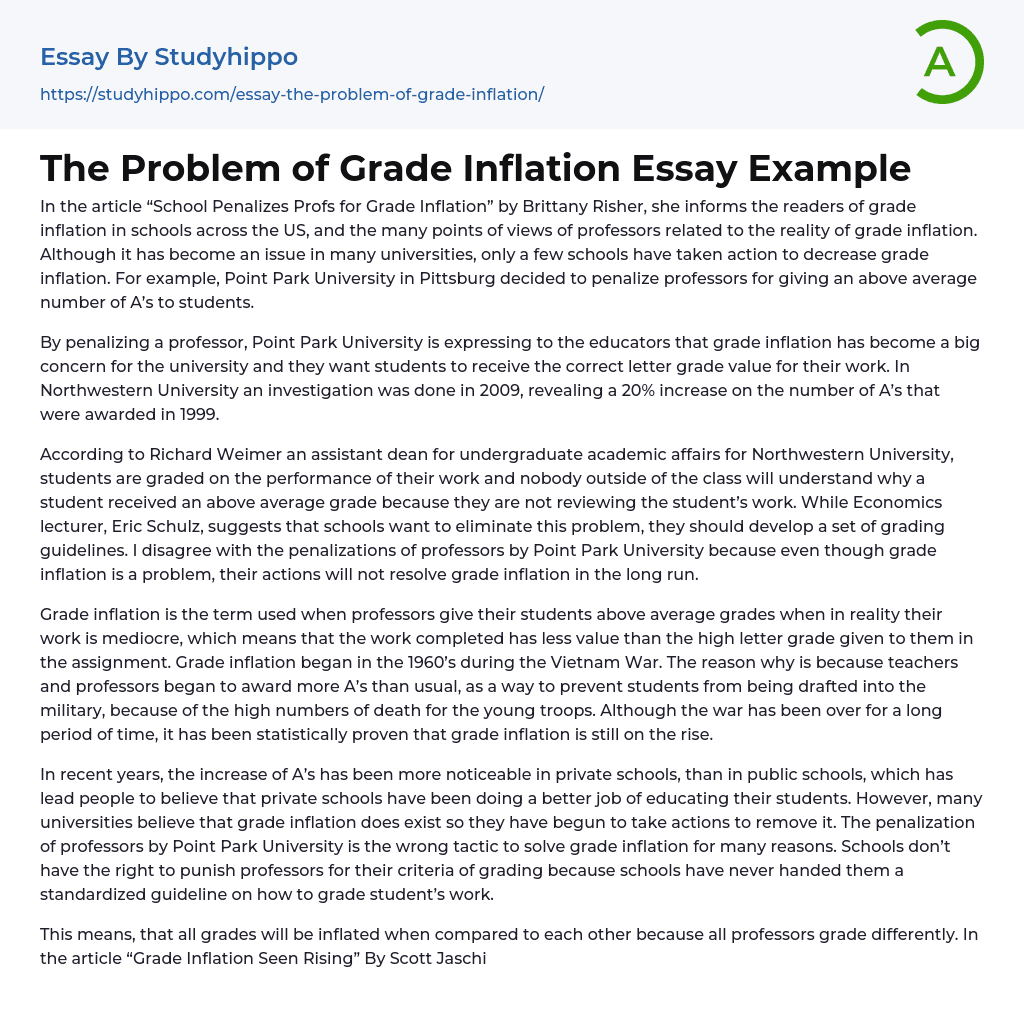Brittany Risher's article "School Penalizes Profs for Grade Inflation" explores the issue of grade inflation in American schools and the differing views held by professors. While many universities are worried about grade inflation, only a few have taken action to combat it. Point Park University in Pittsburgh is one such institution that has decided to penalize professors who excessively give out A grades.
Point Park University is addressing the issue of grade inflation by penalizing a professor. They believe it is important for students to receive accurate letter grades for their work. Similarly, Northwestern University conducted an investigation in 2009 that showed a 20% rise in the number of A's awarded compared to 1999.
Richard Weimer, an assistant dean for undergraduate academic affairs at Northwestern University, contends th
...at grades are grounded in students' work performance and cannot be comprehended accurately by external parties who do not assess the students' work. Eric Schulz, an Economics lecturer, proposes that schools should establish grading guidelines to tackle this problem. Nevertheless, I differ with Point Park University's choice to penalize professors as it will not ultimately resolve the issue of grade inflation.
Grade inflation refers to the phenomenon where professors award above average grades to students, even if their work is only mediocre. This results in the work completed by students having less value than the high letter grade they receive. Grade inflation originated during the Vietnam War in the 1960s. It began when teachers and professors started to give out more A’s than usual to prevent students from being drafted into the military due to the high casualties among young troops. Despit
the war being over for a long time, statistics show that grade inflation continues to increase.
In recent years, private schools have seen a larger rise in A's compared to public schools, which has led to the perception that private schools are better at educating students. However, universities acknowledge grade inflation and are working to tackle it. Point Park University's approach of penalizing professors is not an effective solution for combating grade inflation. Punishing professors for their grading criteria is unfair since they have not been given a standardized guideline on how to evaluate student work.
The text acknowledges that all grades will be inflated in comparison to one another due to the varying grading methods of professors. In the article "Grade Inflation Seen Rising" by Scott Jaschik, Kay McClenney, the director of the Community College Survey of Student Engagement, illustrates that an A in an English 301 class may not hold the same significance as an A in another English 301 class. It is unlikely to find a class nationwide that assigns similar value to their A grades.
Universities should not rely on professors to stop grade inflation, as standardizing one school will not solve the issue for the entire system. Consequently, grade inflation will resurface in schools over time. A possible solution to eradicate grade inflation is to eliminate letter grades, prompting professors to assess students individually and provide them with specific feedback on areas of improvement needed to pass the course.
Inflated grades are a concern for schools, but if professors adhere to course requirements, this worry can be eliminated. Grade inflation has been a longstanding problem
in schools and has resulted in decreased student motivation. The decrease in motivation is due to students exploiting professors' grading methods, causing them to lose their drive to excel in the class.
The article "A History of College Grade Inflation" by Catherine Rampell discusses how the problem of grade inflation affects students. When students realize that average work will still earn them an A, their motivation to excel diminishes. This lack of differentiation among students causes a decrease in overall productivity. However, if students can outperform their peers in terms of grades, their motivation to study and learn will increase.
In conclusion, the number of diligent students will increase. Despite some people arguing that grade inflation is not real because parents and educators have made more effort to prepare students for school, Elain Woo's article "College Board Chief Rips Grade Inflation" reveals that A grades have risen by 37% since 1987, while SAT scores for verbal and math tests have declined.
In essence, grade inflation can be observed in the disparity between above-average grades given to students and their SAT scores. If students were truly receiving a better education, both their SAT scores and GPAs would increase, not just one. Grade inflation is a significant issue that should not be disregarded. Ultimately, schools should not try to solve grade inflation by punishing educators, as this approach would be unsuccessful. They would achieve greater success by introducing innovation and standardizing their grading methods.
- Academic Degree essays
- Academic Dishonesty essays
- School Uniform essays
- Academic writing essays
- Cheating essays
- Interpretation essays
- Plagiarism essays
- Analogy essays
- Learning English essays
- Academia essays
- Academic And Career Goals essays
- Academic Integrity essays
- Brainstorming essays
- Brown V Board of Education essays
- Brown Vs Board Of Education essays
- Coursework essays
- Curriculum essays
- Distance learning essays
- Early Childhood Education essays
- Education System essays
- Educational Goals essays
- First Day of School essays
- Higher Education essays
- Importance Of College Education essays
- Importance of Education essays
- Language Learning essays
- Online Education Vs Traditional Education essays
- Pedagogy essays
- Philosophy of Education essays
- Purpose of Education essays
- Scholarship essays
- Study essays
- Studying Abroad essays
- Studying Business essays
- Technology in Education essays
- The Importance Of Higher Education essays
- Vocabulary essays
- Writing Experience essays
- American Dream essays
- Barriers To Entry essays
- Capitalism essays
- Central Bank essays
- Compensation essays
- Consumerism essays
- Economic Development essays
- Economic Growth essays
- Economic Inequality essays
- Economic System essays
- Economy essays
- Employment essays




